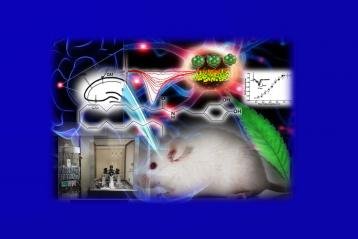The central focus of Dr. Raj Balapal’s laboratory is to understand the function of endocannabinoid systems and epigenetics in synaptic plasticity and learning and memory disorders.
While the main focus of the lab is on fetal alcohol spectrum disorder (FASD), our studies span many different drug (marijuana and synthetic cannabinoids or Spice) induced synaptic disorders.

Overview
Research in the Balapal lab is focused on the function of lipid-derived messengers, with particular emphasis on the endogenous cannabinoids anandamide and 2-arachidonoylglycerol. Current research efforts converge on three areas: endocannabinoids signaling; physiological roles of the endogenous cannabinoid system during early brain development; understanding the role of endogenous cannabinoid system in synaptic plasticity and learning and memory disorders.
Hippocampal slices and primary neural cell cultures and state-of-the-art double patch-clamp and slices electrophysiology is used to understand the physiological role of endocannabinoids; liquid chromatography/mass-spectrometry is used to investigate the formation and deactivation of anandamide and 2-arachidonoylglycerol in brain cells.
Western blot and molecular biology approaches are employed to characterize the molecular mechanisms underlying these processes. The potential pharmacological agents that interfere with various aspects of endogenous cannabinoid function, and their therapeutic potential is explored in vitro and in vivo for many learning and memory disorders.
Dr. Balapal also investigates marijuana, synthetic cannabinoids and endocannabinoid compounds that stimulate the CB1 cannabinoid receptor and regulate signal transduction pathways in the brain hippocampus. The lab studies the endocannabinoids and their CB1 receptor signaling in the regulation of synaptic plasticity and learning and memory disorders.
In addition, the lab investigates epigenetic modifications such as histone associated DNA methylation and histone protein acetylation and methylation of many target genes including CB1 receptor gene and their transcriptional regulation in many cognitive disorders.
Current Research
Dr. Balapal’s current investigation is focused on the function of endocannabinoids such as anandamide and its CB1 receptor mediated signaling in the development of fetal alcohol spectrum disorder (FASD). FASD is one of the major causes of intellectual disability in western nations. The goal is to explore how early ethanol exposure induces persistent expression of CB1R to adulthood and to examine epigenetic modifications at the CB1R promoter in brain structures.
The lab also explores how persistent expression of CB1R disrupts development of the synaptic circuit events. Furthermore, the research group evaluates how early ethanol induced neurobehavioral deficits can be attributed to persistent CB1R activity.
Recent Publications
Epigenetic abnormalities due to developmental ethanol exposure:
- Joshi V, Subbanna S, Shivakumar M, Basavarajappa BS. CB1R regulates CDK5 signaling and epigenetically controls Rac1 expression contributing to neurobehavioral abnormalities in mice postnatally exposed to ethanol. Neuropsychopharmacology. 2018 Aug 22. PMID: 30143782.
- Subbanna S, Nagre NN, Shivakumar M, Joshi V, Psychoyos D, Kutlar A, Umapathy NS, Basavarajappa BS. CB1R-Mediated Activation of Caspase-3 Causes Epigenetic and Neurobehavioral Abnormalities in Postnatal Ethanol-Exposed Mice. Front Mol Neurosci. 2018 Feb 20;11:45. PubMed PMID: 29515368.
- Subbanna S, Nagre NN, Shivakumar M, Basavarajappa BS. A single day of 5-azacytidine exposure during development induces neurodegeneration in neonatal mice and neurobehavioral deficits in adult mice. Physiol Behav. 2016 Dec 1;167:16-27. PubMed PMID: 27594097.
- Basavarajappa BS, Subbanna S. Epigenetic Mechanisms in Developmental Alcohol-Induced Neurobehavioral Deficits. Brain Sci. 2016 Apr 8;6(2). PubMed PMID: 27070644.
- Subbanna S, Nagre NN, Umapathy NS, Pace BS, Basavarajappa BS. Ethanol exposure induces neonatal neurodegeneration by enhancing CB1R Exon1 histone H4K8 acetylation and up-regulating CB1R function causing neurobehavioral abnormalities in adult mice. Int J Neuropsychopharmacol. 2014 Oct 31;18(5). PubMed PMID: 25609594.
- Nagre NN, Subbanna S, Shivakumar M, Psychoyos D, Basavarajappa BS. CB1-receptor knockout neonatal mice are protected against ethanol-induced impairments of DNMT1, DNMT3A, and DNA methylation. J Neurochem. 2015 Feb;132(4):429-442. PubMed PMID: 25487288.
Signaling defects due to alcohol exposure during development:
- Subbanna S, Joshi V, Basavarajappa BS. Activity-dependent Signaling and Epigenetic Abnormalities in Mice Exposed to Postnatal Ethanol. Neuroscience. 2018 Jul 20. PubMed PMID: 30031835.
- Basavarajappa BS, Shivakumar M, Joshi V, Subbanna S. Endocannabinoid system in neurodegenerative disorders. J Neurochem. 2017 Sep;142(5):624-648. PubMed PMID: 28608560.
- Basavarajappa BS. Fetal Alcohol Spectrum Disorder: Potential Role of Endocannabinoids Signaling. Brain Sci. 2015 Oct 29;5(4):456-93. PubMed PMID: 26529026.
- Subbanna S, Shivakumar M, Psychoyos D, Xie S, Basavarajappa BS. Anandamide-CB1 receptor signaling contributes to postnatal ethanol-induced neonatal neurodegeneration, adult synaptic, and memory deficits. J Neurosci. 2013 Apr 10;33(15):6350-66. [Erratum in: J Neurosci. 2013 Jul 3;33(27):11323.] PubMed PMID: 23575834.


